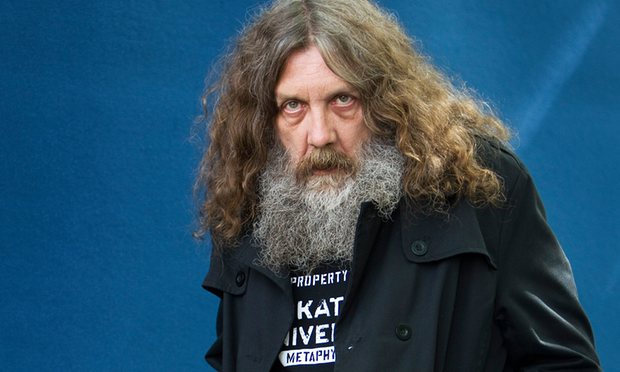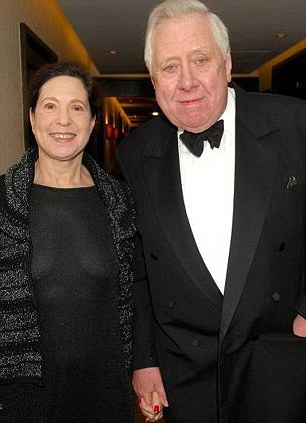Working-Class Zero: The Political Autism of Alan Moore and His Labour Party Friends, Part 1

Alan Moore
Genius. It’s an over-worked term in modern popular culture, quickly bestowed on any musician, artist or writer who becomes famous or influential. But there are people for whom it seems appropriate. The British writer Alan Moore is one of them. In his prime, this proud son of Northampton bestrode the world of comics like a colossus, imagineering, innovating and inspiring like a combination of Hieronymus Bosch, H.P. Lovecraft and William Burroughs. He was, and remains, a master of both words and images, synergizing the verbal and the visual to create worlds of wonder for his millions of awestruck fans.
Alan Moore is a genius. It doesn’t sound wrong to say that.
Goodthinkful liberals
At least, it doesn’t sound wrong if you are one of those many fans. But I’ve never felt the Moore magic myself. I’ve tried masterpieces of his like Watchmen (1987) and V for Vendetta (1985) and found them over-written, pretentious and confused. And I thought this long before I became a crazed political extremist. When I first read Watchmen I was a goodthinkful liberal too, resolutely opposed to racism, sexism and homophobia.
That was then. Now I reject Moore not just as a writer but as a thinker too. His art is adolescent and so are his politics. Like the Yorkshire playwright Alan Bennett, he makes much of his humble origins and the simplicity and decency of his working-class parents. And like Bennett, he unflinchingly supports all the forces in British politics and culture that most despise the working class and people like his parents.
On the upside, those same forces will shower riches on any talented working-class writer who demonstrates his goodthinkfulness and collaborates with them in their anti-prole endeavours. As I pointed out in “Bend It Like Bennett,” Alan Bennett is a rich man who was well able to afford a wallet-lightening encounter with some vibrant Romanian Gypsies. Alan Moore is also rich: he has recently donated £10,000 to help a friend bring his “African wife” over from Mozambique. The British government were asking the friend to prove that he had the “minimum income threshold” required to support a foreign wife.
Moore thought there was “some unpleasant racial issue” in his friend’s difficulties, concluded that “racism” was at work, and expressed his “continuing incredulous disgust over the manner in which Mr Cousins and his wife Paula have been kept separate for what is now a period of years.”
In short, Moore was virtue-signalling, secure in the knowledge that his donation and the opinions that accompanied it would bring him nothing but approval and admiration from his fellow liberals.
“A clear majority of Labour voters…”
But is immigration from Africa and the rest of the Third World good for the working class from which Moore emerged? The working class didn’t think so, as the Labour party has always been very well aware. For proof of that, look at these comments by Roy Hattersley, the salt-of-the-earth Yorkshireman who was once deputy leader of the Labour party and MP for the Birmingham constituency of Sparkbrook:
How are politicians to behave when, having listened, they find themselves in fundamental disagreement with what they have heard? Should I, in 1964, have called for what a clear majority of my constituents, and most of the country, undoubtedly wanted — the repatriation of all Commonwealth [i.e., Third-World] immigrants? [His answer: “Not in a million years.”] (Politics should be guided by principles, not populism, The Guardian, 5th May 2013) … For most of my 33 years in Westminster, I was able to resist Sparkbrook’s demands about the great issues of national policy — otherwise, my first decade would have been spent opposing all Commonwealth immigration and my last calling for withdrawal from the European Union. (Ideology’s our life, Esther, The Guardian, 31st July 2013)

Baron Hattersley and his Jewish wife
Hattersley has been richly rewarded for betraying the working-class people he was elected to serve. He now sits in the House of Lords as Lord Hattersley and has made large sums from his banal and politically correct writing on British history and culture. In 2013, he married the woman responsible for his wealth, the Jewish literary agent Maggie Pearlstine.
Crusaders for Corbyn
Alan Moore and Alan Bennett have also made large sums from their writing. Like Hattersley, they have had to betray the working-class to do so. That’s why it’s no surprise that they are both passionate supporters of Jeremy Corbyn, the Social Justice Warrior (SJW) who currently leads the Labour party and who has just won an increased mandate from the middle-class SJWs now ascendant there. Moore has praised Corbyn as “someone who offers a future that ordinary people could actually live in.” Corbyn wants much more immigration from the Third World, so under-age working-class girls in Rotherham and Oxford might disagree with Moore’s assessment.

Jeremy Corbyn with a vibrant New Briton
But White-trash girls don’t buy Moore’s books or write PhD theses about his subversive deployment of superhero tropes, so he can safely ignore their racism and xenophobia. Here’s some more from the article Moore wrote for his local branch of Momentum, the organization set up to support Corbyn’s social justice revolution:
As an anarchist, as someone who believes neither in leaders nor the means by which we select them, I’m obviously at something of a disadvantage when it comes to making political endorsements of any kind. That said, I wasn’t born an anarchist. I was born to an ordinary working-class couple in the closest thing that Northampton has to a ghetto, and I was raised with the probably simplistic but heartfelt belief that it was the duty of our family and people like us to vote Labour since Labour, unambiguously, was the party of the working people. Back then in the 1950s, my parents’ belief was based not on wistful idealism but on the insurmountable fact that the post-war Labour government had introduced a National Health Service and had allowed access to free education for their children. These were simple, unsophisticated people who felt that their class had taken the brunt of the Second World War, and who looked upon the promise of a fairer future as a well-deserved reward for their hardships.

Anarchist for authoritarianism: Alan Moore
I wish both of them had survived longer, of course I do, but at the same time I am somehow glad that they were both gone by 1997 and thus never lived to have their hearts broken by the advent of Tony Blair and his rebranded Diet-Tory New Labour party. In the decades since then, had they witnessed this country’s purported left wing, I’m confident that they wouldn’t have had the first idea what they were looking at. The thing that they believed in and fought for has become unrecognisable and completely inimical to all working class principles and values. … Jeremy Corbyn is about the only current political figure that the working class that I grew up among could have recognised as such. Don’t miss this opportunity to throw all of the weight you have behind him and to struggle towards a future that we and all of the people who came before us could breathe in; could actually take pride in. It is time for this horrific and inhuman nonsense to stop, and if you’re going to vote then I suggest you vote for someone who looks willing to stop it. (Alan Moore at Momentum Northants, September 2016)
Moore’s naivety and ignorance are beyond parody. How can a self-professed anarchist support the authoritarian leader of a highly authoritarian party? And now can he claim that it was only Blair’s New Labour that turned against the working class? As we’ve already seen, the Labour veteran Roy Hattersley openly boasts that he was “able to resist” his working-class constituents’ “demands about the great issues of national policy.”
Accordingly, he didn’t spend his “first decade” in parliament “opposing all Commonwealth [i.e., Third-World] immigration.” That was in the 1960s, when the “Diet-Tory” Tony Blair was still going through his expensive private education. In other words, Labour was “inimical” to “working class principles and values” long before Moore’s parents passed away.
The Largesse of Levy
His parents were mistaken to continue supporting the party, but the working-class believed in loyalty and tradition. They trusted Labour and didn’t realize how thoroughly they were being betrayed. Blair’s “New Labour” was merely the latest stage of that betrayal, not the hijacking of a party friendly to the working-class. By the 1950s, the Labour party was already a long way from its roots. At the beginning of the twentieth century there was genuine socialism in Britain. That’s why one of Labour’s greatest future heroes denounced bosses in Scotland when they tried to bring cheap labour from Lithuania into the Scottish mining industry:
Trade Unions were openly hostile, claiming that the newcomers’ lack of English made them a danger at work; the Glasgow Trades Council declared the Lithuanians in Glengarnock as “an evil” and wrote to the TUC [Trades Union Congress] demanding immigration controls to keep them out.
Even a figure such as Keir Hardie, founding father of the Labour Party, led a fierce, xenophobic campaign against the Lithuanians. Hardie, as a leader of Ayrshire miners, wrote an article for the journal, The Miner, in which he stated that: “For the second time in their history Messrs. Merry and Cunninghame have introduced a number of Russian Poles [as the Lithuanians were described] to Glengarnock Ironworks. What object they have in doing so is beyond human ken unless it is, as stated by a speaker at Irvine, to teach men how to live on garlic and oil, or introduce the Black Death, so as to get rid of the surplus labourers.” (Lithuanians in Lanarkshire, BBC History, February 2004)
Keir Hardie was “xenophobic” not because he hated foreigners, but because he knew how bad mass immigration was for the working-class. Roy Hattersley was xenophilic for the same reason: by the 1960s, Labour had been taken over by forces that despised the working class rather than defended it. In other words, New Labour was not something new. Its front-man Tony Blair became Labour leader after the premature death of John Smith, which was a great relief to the Labour fundraiser Michael Levy, a Jewish entrepreneur and ardent supporter of Israel. Smith had been a shabbos goy, but Blair far surpassed him. He was delighted to accept as much money as Levy could raise from other Jewish entrepreneurs.
In return, Blair elevated Levy to the peerage and followed Levy’s bidding on “great issues of national policy”: he took Britain into the disastrous Iraq war and opened Britain’s borders to the Third World. Open borders are very bad for the working-class. But that was a feature, not a bug, of Labour’s immigration policies, as a Labour insider admitted in 2011:
Labour let in 2.2 million migrants during its 13 years in power – more than twice the population of Birmingham. Lord Glasman, 49, had already told BBC Radio 4 recently [in 2011]: “What you have with immigration is the idea that people should travel all over the world in search of higher-paying jobs, often to undercut existing workforces, and somehow in the Labour Party we got into a position that that was a good thing. Now obviously it undermines solidarity, it undermines relationships, and in the scale that it’s been going on in England, it can undermine the possibility of politics entirely.”
The academic, who directs the faith and citizenship programme at London Metropolitan University, criticised Labour for being “hostile to the English working class”. He said: “In many ways [Labour] viewed working-class voters as an obstacle to progress. Their commitment to various civil rights and anti-racism, meant that often working-class voters … were seen as racist, resistant to change, homophobic and generally reactionary. So in many ways you had a terrible situation where a Labour government was hostile to the English working class.” (Miliband ally attacks Labour migration “lies” over 2.2m they let in Britain, The Daily Mail, 16th April 2011)
The Minister for Immigration who oversaw this attack on the working-class was the peculiar Barbara Roche, a Jewish SJW who “entered politics … to combat anti-semitism and xenophobia in general.” Roche “loves” and “feels comfortable” in a society atomized by mass immigration. The working-class don’t share her enthusiasm for Third-World enrichment, because they have to suffer the crime, lowered wages and social destruction that it inevitably brings.





Comments are closed.